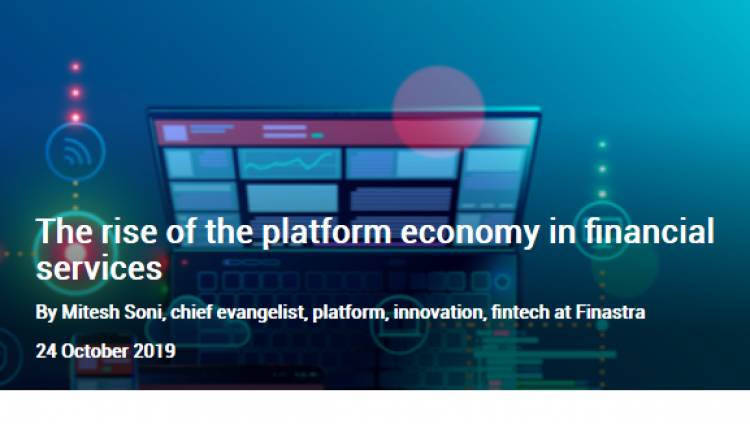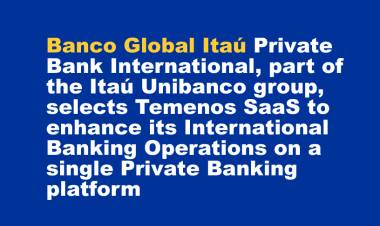The rise of the platform economy in financial services

Platforms, APIs and open banking are rewriting the rules and creating powerful new ways to engage with the customer at lower cost. When it comes to future technologies how should bank leaders shape their strategy to embrace digital and make the most of the opportunities in the face of limited budgets, rising costs and a tight skills market? I reached out to five of the leading global fintech influencers to hear their points of view on where the industry is heading focusing in on key opportunities and innovations
APIs, open banking and PSD2
The world of banking is progressing rapidly with the rise of new challengers, ever more partnerships between banks and fintechs, and new marketplace offerings combining microservices and open APIs. Fintech friendly regulation like PSD2 in Europe is creating a perfect storm for the banking industry allowing for greater competition and stronger insights into customer behaviour through data analytics.
Industry 4.0 promises to herald in a new era of platform players delivering products and services designed to accurately meet the personalised needs of customers in a more tailored way throughout their lives.
So what’s the perspective of Xavier Gomez @Xbond49 on this new era? “PSD2 rules clearly push banking sectors to renovate the customers relationship (B2B and B2C) for lower cost. The first wave of APIs in Europe was disappointing in terms of quality of data provided. Why? Banks produce a lot of data but they do not know how to use and leverage it unlike the GAFA. Open banking is an opportunity to build new banking services that are customisable to customers thanks to the “platformisation” concept. Banks can apply a digital transformation policy by rebuilding a new IT core banking system (open source), by integrating fintech solutions and collaborating with start-ups.”
I also spoke with Ronald van Loon @Ronald_vanLoon on how APIs are an important first step to shaping the customer experience with open banking paving the way. He believes that banks and financial institutions as we know them today will disappear by 2030. “Today’s financial service providers have to become an API or customer experience bank and start to build solutions that enable them to successfully compete in the next-generation banking landscape. 80 percent of heritage banks will disappear by 2030, and financial service firms need to prepare strategic responses to regulatory and digital disruptions. There’s a growing shift towards customer-facing ecosystems, and banks must create contextual experiences throughout all touchpoints in the customer journey to bring new levels of personalisation to the customer experience and extend their offerings. In our current age of open banking, financial service providers can look for new partnership models that can help them innovate and deliver greater value to their customers.”
Cloud first, digital natives and culture champions
In the past, financial institutions have predominately looked to build infrastructures themselves in house. This approach resulted in a high cost to build, service and enhance, but necessary during an era of legacy technologies. Today, the story is very different. It is now possible to lease core banking software, hosted in the cloud, with pre-integrated fintech components from the get-go. Speed to market of onboarding customers from day one gives crucial competitive advantage for new players to grow quickly. Scarce resources can be redeployed to the functions that strategically direct the company forward and keep the skills fresh and relevant. However, the leap to the cloud and modern technologies doesn’t happen overnight and the new skillsets and mindsets are an important consideration to ensuring smooth migration.
“I believe it’s a mindset shift that will help build a “future ready” corporation. Chasing tech tools alone is not the solution. API, blockchain, AI, data analytics - will not provide the community engagement, transparency and trust that organisations need to ride the tsunami of digital transformation. The mindset shift is primarily a genuine customer focus and alignment with their values, plus re-learning essential skills. “Learn, unlearn, relearn” is the DNA of the future of work!” comments Helene Li @helene_wpli.
Collaborate to innovate
Innovation used to be restricted to the R&D labs of large organisations but increasingly the world has moved to an open model for innovation. New ideas can stem from universities, corporates and fintechs with more and more uncommon partnerships yielding impressive results. Collaboration delivers fast and sometimes unexpected innovation with new products and services delivered through lower touch ecosystem channels. Collaboration has become the new innovation for financial services reducing cost, time to market and ensuring speed of innovation through fintech collaboration.
Embracing platform
The banking industry has been slow to embrace platform models, but this is changing rapidly. Platforms change business models creating exciting new ways to grow revenue streams, attract new customers and transition to adjacent industries. Take for example account aggregators. For the first time they have enabled customers convenient access to their financial data footprint across multiple accounts. Insights gleaned from this data drives their financial choices leading to new product and services adoption.
Now financial institutions can really ‘know their customers’ through intelligent insights and provision of more tailored products and services. It’s a win-win situation where fintechs with exciting technology, but perhaps fewer customers, can be paired with digital customers through a marketplace of self-discovery. As more APIs are created, more fintech use cases are established, attracting more customers and ultimately unlocking more value for platform users, growing the industry collectively.
Spiros Margaris @SpirosMargaris gave his insight on how financial institutions need to adapt, “The large financial institutions - the incumbents - will have to embrace drastic changes to their business models to stay relevant. To win in the fintech environment where for instance platforms, APIs and open banking allow new players to engage with customers at lower costs, all financial participants have to leave their comfort zone to succeed.”
Embedding financial services in customer journeys
Customer expectations are changing, imagining instant banking services, not only available 24/7 but predicting and providing tailored and personalised services that enhance their lives.
"As customers change how they live and how they make a living, the financial services industry must innovate to meet the needs of modern-day consumers or they risk becoming obsolete. To migrate beyond insights based on historical data towards guidance based on prediction of future behaviour, banks need to partner with fintech start-ups to deliver more holistic solutions. This is the true value of open banking – one that we have yet to realise,” says Theo @psb_dc.


















